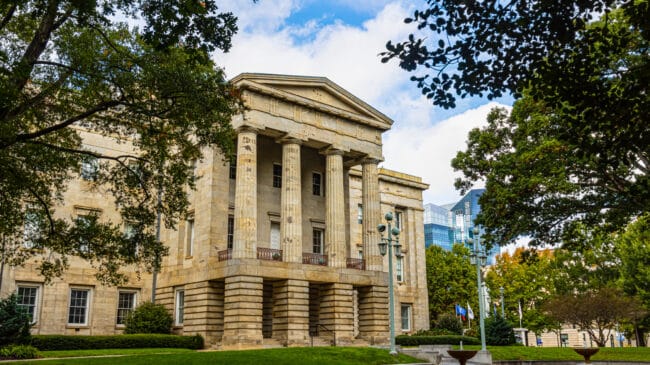The North Carolina State Senate made history in early June by passing the first medical marijuana bill that cleared one of the state’s legislative chambers. But North Carolina House Speaker Tim Moore (R) was adamant that “there are a lot of concerns with this bill” and he would not bring the medical marijuana bill up in the lower chamber.
“I think it’s something that’s going to really require further study,” Moore claimed, according to Marijuana Moment.
The bill would create a highly limited medical marijuana program in which only patients with certain debilitating medical conditions would be allowed to participate. These include cancer, epilepsy, HIV or AIDS, ALS—amyotrophic lateral sclerosis, Crohn’s disease, sickle cell anemia, Parkinson’s disease, multiple sclerosis, cachexia, severe and persistent nausea, post-traumatic stress disorder, or a terminal illness in which the patient has less than six months to live. Notably absent from this list are broader conditions that make a patient eligible to participate in most state medical marijuana programs, such as severe pain and mental health conditions, including anxiety and depression.
The production side of the medical marijuana bill would be even more restrictive, limiting the total number of available licenses to operate a medical marijuana business to a mere 10 businesses. Regulators would narrow down the field to 20 applicants and submit them to a commission of political appointees, who would select 10 of the 20 recommended applicants.
This selection method would be highly susceptible to political manipulation or corruption, as appointees could select politically connected applicants to receive licenses. A similar commission in Michigan was scrapped in 2019 after stories of corruption emerged. All the commission’s duties were consequently folded into Michigan’s Marijuana Regulatory Agency, which immediately improved approval timelines as regulators were instructed to strictly apply rules rather than make arbitrary political decisions.
Each of the 10 applicants ultimately awarded licenses in North Carolina would then be able to cultivate and manufacture medical marijuana products and sell those products through medical marijuana dispensaries they also own. In other words, vertical integration of the supply chain would be mandatory and no wholesale transfers of medical marijuana products would be permitted between licensees. Each licensee would be allowed to open no more than eight dispensaries, meaning a maximum of 80 dispensaries statewide, which is fewer than the number of counties in North Carolina.
Vertical integration requirements in marijuana laws have proven to be challenging in other states for a number of reasons. For entrepreneurs who are not well endowed with capital, the capital requirements necessary to outfit large cultivation and manufacturing operations along with multiple retail locations can be staggering. Legal cannabis businesses generally cannot acquire bank loans or other debt capital due to their products still being illegal at the federal level, so these legal businesses are largely funded through private equity.
Similarly, some entrepreneurs may have the skillset to operate a marijuana cultivation facility, but not have as much expertise in manufacturing or retail. Each of these stages of the supply chain is a distinct business operation that demands different forms of expertise and shouldn’t be forced together in marijuana laws.
These are not the only shortcomings of the North Carolina medical marijuana proposal. State lawmakers also proposed barring any applicant from the legal marijuana industry if the majority owner of the business had not been a North Carolina resident for at least two years prior. Residency requirements like this are patently unconstitutional. The U.S. Supreme Court has clearly ruled that they impose unnecessary barriers to interstate trade in violation of a body of law known as the Dormant Commerce Clause.
Beyond that, the medical marijuana bill would impose a 10 percent tax on the gross receipts of all licensees. Several states impose no special excise tax on medical marijuana, even if they do so for adult-use marijuana, in recognition of the fact that patients are purchasing these goods to fill a medical need under the supervision of a doctor. Medical marijuana sales would also have been subject to the general sales and use tax. These taxes would compound the federal tax penalty for marijuana businesses, creating a price disparity between legal and regulated medical marijuana and illicit marijuana that can undermine the orderly, legal market.
In spite of the bill’s shortcomings, it is somewhat encouraging that North Carolina had the bipartisan votes to move a medical marijuana proposal out of at least one legislative chamber. This comes months after South Carolina lawmakers also passed a medical marijuana bill out of their upper chamber. Together, these incremental signs hopefully represent a changing of attitudes toward medical marijuana in the Carolinas, which are among the last remaining bastions of medical marijuana prohibition in America.
Perhaps with another year and more improvement of the legislative language, the Carolinas can launch functional medical marijuana markets that help patients get the relief they need and increase freedom in those states.

